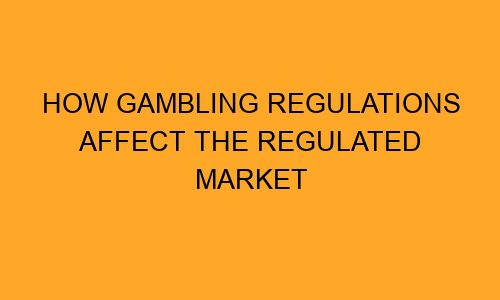The Gambling industry has grown to become one of the largest arms of the global economy. Recent studies expect the industry to reach $92.9 billion by 2023, making it one of the most lucrative sectors of the global entertainment industry. Some experts attribute this boom to the growing presence of online gambling service providers that now offer more accessible gambling options.
Online gambling has created wider income streams for gambling operators, allowing punters to wager from the comfort of their homes and through most internet-enabled devices. However, this ease of gambling access has also become a bane for addicted gamblers and everyone trying to wean them off their addiction.
Several countries have heavy restrictions on gambling activities within their borders. And these varying levels of gambling regulations create proportionate effects on their gambling communities. So, let’s look at different gambling jurisdictions and how their gambling regulations affect the markets.
Heavily Regulated Markets – The UK and Sweden
Some countries operate what we term Heavily Regulated Markets. These countries have restrictions covering gambling licenses and how customers interact with gambling service providers.
The UK has one of the most popular gambling restriction schemes globally. Gamstop has become a term for gambling regulations even outside the UK, proof of the heavy and effective regulation on responsible gambling.
The pressure for responsible gambling makes more sense when you realize that about 73% of the English population explores gambling options. That is at least 48 million people who occasionally place bets with the hope of winning. The Providence Project made a 2022 estimate showing that at least 430,000 UK punters are gambling compulsively. And the UK Gaming Commission has stringent policies to manage this addiction. The Commission employs the following measures in its management of vulnerable gamblers:
- Regulated access to gambling materials
- Oversight of gambling publicity
- Regulating the use of gamblers’ private details
These measures are remarkably efficient, but Gamstop remains the crowning jewel of responsible gambling in the UK. As part of the National Online Self Exclusion Scheme, Gamstop allows vulnerable gamblers to restrict their access to gaming services for a predetermined period. This restriction excludes the gamblers from all UKGC-licensed service providers until the restriction period ends.
Gamstop and other gambling regulations in the UK are so effective that only Sweden seems to match the restrictions. The Swedish Gaming Authority (Spelinspektionen) is younger than the UKGC, but it already has outstanding results. Gambling in Sweden has moved from a messy, unregulated system to a heavily regulated setup with restrictions on cheating and addiction.
Introducing Spelpaus may be an overt adaptation of the UK’s Gamstop Scheme, but the Spelinspektionen added innovative twists. The Swedish Gambling Act has some restrictions for unlicensed online casinos.
While the UK has a growing crop of Non Gamstop Casinos, Sweden wears them down with network restrictions. The Act empowers the Spelinspektionen to have Internet Service Providers send warning messages to unlicensed casinos and restrict their activities within Sweden.
Gambling is still a growing industry in the UK and Sweden, but the consumer protection laws in both countries ensure that the customers don’t lose themselves in the thrill of the games.
Medium Regulated Markets – Germany and Holland
The 2021 Interstate Treaty on Gambling is one of Germany’s landmark legislations. The Treaty opened Germany to a transition from the old stringent laws against online gambling to a more progressive gambling industry regulation. The Treaty includes guidelines on advertisements, taxation, and even licensing of the gambling industry in Germany.
This is a big shift from when only one region, Schleswig-Holstein, accommodated online gambling in the entire country. The Interstate Treaty on Gambling permits all regions to license and regulate online gambling and institutes some regulatory framework for all gambling activities.
The overarching theme of the Treaty is to protect the interest of the consumers and prevent gambling addictions. This means that gaming restrictions like limiting how much each player can deposit into their gambling purse every month or how much they can wager on certain games. It even restricts what kind of games are available for gambling. These restrictions create a flourishing range for the gambling industry, but it is also prohibitive enough to manage how players interact with the games.
Holland runs a similar framework as Germany. The crust of gambling limitations in the country is Consumer Protections.
Between the Dutch Gaming Authority and the Consumer Protection Association, Consumentenbond, Holland maintains protective gaming standards. The Consumentenbond considers itself the basic defense for consumers, and they go as far as boycotting the Advertising Code Foundation because they consider the gambling advertisements unsafe for vulnerable gamblers.
Despite these restrictions, Holland currently has about 1.5 million active gamblers, and its gambling industry is worth about 800 million euros. These growing gambling industries indicate the permissive measures Germany and Holland employ to protect their gambling population without crushing the game service providers.
Light Regulations – MGA and Curacao
Malta and Curacao have such light regulations that their gambling restrictions seem non-existent. The islands have become home to most “offshore” gambling outfits because they offer more regulatory liberties than other countries.
Like most gambling regulators, the Malta Gaming Authority only grants its license to platforms that meet its standard. The challenge is that neither Malta nor Curacao run severely restrictive gambling standards.
The MGA categorizes gambling as a game of chance and skills, confining it to the same regulations as regular gaming activities. This means that anyone that creates a gambling platform already has a sure licensing chance under the Maltese Gaming Law. This has made the Island a haven for non UK casino seeking credible licensing without the strict regulations of the UKGC.
The absence of restrictions does not mean Malta has thrown its vulnerable gamblers to the wolves. The Island has self-exclusion programs that allow addictive gamblers to sign up with the respective gambling service providers. The service providers all have exclusion services where they can refuse to admit some customers for agreed periods. For example, a player may sign up for exclusion from Poker for a few months, but it is voluntary. The MGA does not play any role in enforcing or regulating this self-exclusion.
Unregulated Markets
It is almost false to claim that some countries have banned gambling within their borders. The overwhelming volume of offshore and unlicensed online casinos makes it impossible to ban online gambling. However, some countries do not have any restrictions or regulatory frameworks to manage online gambling activities within their borders.
The Bahamas, Venezuela, and Bolivia are prominent examples of countries that do not license or regulate online casinos. The result is an astonishing rate of addicted gamblers and an equally large number of underaged gamblers. These countries have been nonchalant about gambling, and their economies are taking a toll.
Some countries like Nigeria, Japan, Brazil, New Zealand, and Singapore have legislation against gambling, but they do not have the enforcements to breach these laws. Unlicensed, Offshore casinos have unlimited reins in these countries, and the effect is evident in the alarming rate of vulnerable gamblers.
What Method is Right for Gamblers?
Responsible gambling has one undeniable flaw- it is impossible to manage. There are countless loopholes and alternatives for vulnerable gamblers. The inability to provide balance also becomes a challenge at the various levels of Gambling Regulations.
Heavily Regulated Markets like the United Kingdom try to balance protecting their vulnerable citizens and maintaining individual freedom. But the Service providers suffer the effects of these restrictions more than their customers.
Gamstop is currently a mandatory program for all UKGC-licensed casinos. Every licensed gaming institution in the UK has to subscribe to Gamstop and follow its prescribed limitations. The consequence is that these casinos lose their customers to Non Gamstop Casinos. In addition, heavily regulated markets often drive their gambling population into the arms of unlicensed casinos that offer lesser restrictions, more bonuses, and fairer deals. This exodus affects the revenue of licensed casinos and puts the players at risk of scams and data violations.
Medium Regulated Markets do not struggle with these risks as they have enough room for the patrons to regulate their access without restraining the activities of the gambling institutions. But the risk is higher with Lightly Regulated Markets. Their unenforced regulations grant the casinos and their customers enough freedom to explore all their gaming options but very little protection against gaming and personal data mishaps.
CONCLUSION
Appropriate regulation for vulnerable gamblers would depend on the gambling community. Self-Exclusion schemes like Gamstop would be effective in the US as most States already regulate and enforce gaming restrictions within their borders. But places like Singapore and the Bahamas would fare better with Medium Regulated Markets as their economy thrives on balancing regulations with individual preferences.

